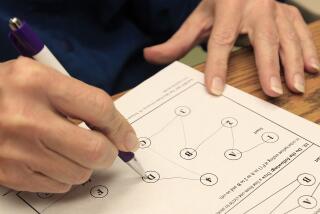Psychological Tests May Prove Helpful for Troubled Teens
- Share via
Getting a psychological evaluation of your teen-ager can be a landmark event.
Typically, it’s the pivot between a long stretch of trouble and a new course of working on solutions. While good things may come from it, it’s also apt to be stressful, confusing and maybe painful.
Especially when dealing with teen-agers, who can be frustrating and at times unfathomable, parents may have their doubts about whether such testing is needed.
When is it necessary? “When parents have tried to do a lot of things to remedy a situation, and they’re beginning to see a pattern--particularly when kids’ grades are consistently poor, or there are emotional or behavioral problems that are scary,” says James Austin, a psychologist in Jackson, Miss., and co-author with John Reaves of “How To Find Help for a Troubled Kid” (Holt; $19.95). If parents are puzzled and they’re out of ideas, it’s time for an evaluation.
Teen-agers sometimes want no part of being tested. They may feel they are being persecuted, stigmatized or just ganged up on. The way the idea is presented is important. “Saying, ‘We’re bringing you here to see how screwed up you are’ ” will not elicit cooperation, Austin says. The parents should engage the child in a cooperative effort to solve problems.
Most teen-agers will cooperate if approached in an uncritical way, Austin says: “Many of them know things have been pretty bad, and most of them will see it’s to their advantage to get some help. They’re as frustrated as their parents are.”
An evaluation, which can cost from $300 to $800 (more if medical tests are ordered), should include an intelligence test, a test of academic skills, a behavior assessment and a personality test, Austin says.
“You try to get a general picture of a lot of different areas of their lives,” he says. “You want input from teachers, from parents, and to do a variety of different things to let that kid have the opportunity to tell you how (he or she feels), and (to) demonstrate their strengths and weaknesses.”
Generally, the process begins with an interview, during which the evaluator talks to the child; observes his or her mood, grooming and dress, and makes preliminary assessments of reasoning, judgment, memory and defense mechanisms--all while looking for signs of the child’s problems.
Psychologists, psychiatrists, education specialists and social workers all do evaluations. Austin recommends the testing be done by a highly trained person who has extensive experience working with adolescents; he favors psychologists.
A good evaluation may require subtle discriminations and judgment about how to administer a test, the authors say: “A social worker or a master’s-level psychologist might do a fine job, but we’d suggest asking some pointed questions about the training and experience of an evaluator who has only a master’s degree.”
They recommend asking: Do you have a license? What groups or institutions are you affiliated with? What experience do you have working with adolescents? Do you have much contact with normal adolescents? (The authors say professionals who don’t may lose perspective.) What kind of tests will you give? How long will they take? What is the charge? Will there be a written report? A conference? What kind of recommendations can we expect?
The results of testing should be explained to the child, Austin says, although not necessarily in the same language used with the parents.
“Whoever does the testing needs to present the information in a way that gives people a sense of how the kid compares with other kids, what’s wrong, and what the strengths and weaknesses are,” Austin says. The point of the evaluation is to arrive at workable recommendations--a plan for solving problems.
Parents should trust their impressions, Austin says. “If the evaluation kind of fits emotionally, if it leads you into dealing differently with your child or making plans, if it feels like it’s useful, it probably is.
“If you walk out puzzled, saying, ‘What do we do now?’ or ‘What use is all this stuff?,’ I’d have to say the evaluation was not of much use,” he says. If you feel the conclusions don’t match up to what you see at home or that the recommendations are impossible to follow, you should discuss your concerns with the evaluator.


